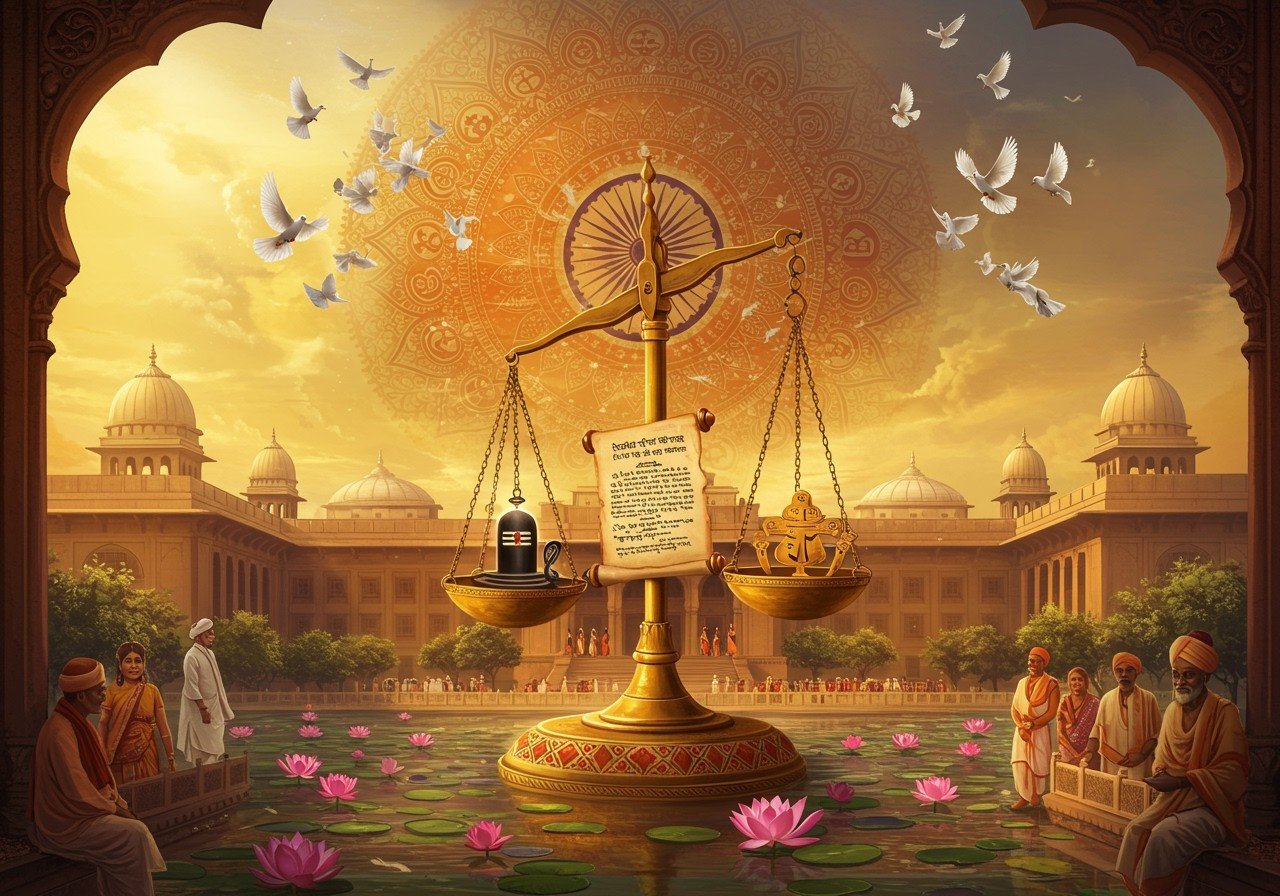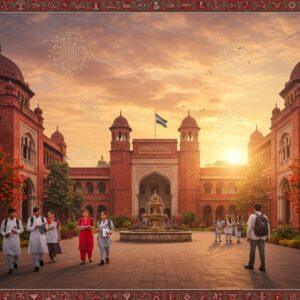
India, a land of vibrant spiritual traditions, upholds the Right to Freedom of Religion as a cornerstone of its democracy. This fundamental right, enshrined in the Constitution, empowers every citizen to embrace and practice their faith without fear or coercion. Understanding these constitutional provisions is paramount, particularly in a nation as diverse as India. In the digital age, the accessibility of online platforms like poojn.in further enhances this freedom, providing convenient access to authentic ritual items and seamlessly blending tradition with modern ease.
Historical Context of Religious Freedom in India
The concept of religious freedom in India has deep historical roots. Ancient civilizations, including the Indus Valley and Vedic periods, laid the foundation for early religious practices. Subsequent influential movements like Buddhism, Jainism, and Islam further enriched the religious landscape, contributing to the diverse tapestry of beliefs that exist today. While the colonial era presented challenges to religious expression, prominent figures like Mahatma Gandhi and Jawaharlal Nehru championed the importance of tolerance and interfaith harmony.
Constitutional Provisions for Religious Freedom
The Indian Constitution explicitly safeguards religious freedom through several key articles:
- Article 25: Guarantees the freedom of conscience and the right to freely profess, practice, and propagate any religion. This article emphasizes the individual’s autonomy in matters of faith and belief.
- Article 26: Empowers religious denominations to manage their own affairs in matters of religion. This includes the right to establish and maintain institutions for religious and charitable purposes, and to manage their own properties.
- Article 27: Prohibits the state from compelling any person to pay taxes for the promotion or maintenance of any particular religion. This ensures that individuals are not financially burdened by supporting religions they do not follow.
- Article 28: Protects individuals from being compelled to participate in religious instruction or worship in certain educational institutions. This provision upholds the principle of secular education and respects individual religious choices.
These constitutional provisions collectively protect the diverse religious practices prevalent in India, fostering an environment of respect and tolerance.
Poojn.in supports these rights by offering a wide selection of religious items, ensuring individuals can practice their faith with authentic materials.
Secularism in India
Secularism in India, as enshrined in the 1976 amendment to the Constitution’s preamble, signifies equal treatment of all religions by the state. This interpretation differs from Western models, emphasizing religious neutrality rather than strict separation of church and state. Landmark Supreme Court judgments have shaped the understanding and implementation of secularism in India. While ongoing debates and challenges exist, secularism remains a crucial pillar supporting religious freedom by ensuring non-discrimination against any faith.
Challenges to Religious Freedom
Despite constitutional guarantees, upholding religious freedom in India faces certain challenges:
- Religious Intolerance and Communal Violence: Instances of religious intolerance and communal violence pose a threat to peaceful coexistence and undermine the spirit of religious freedom.
- Political and Social Dynamics: Political and social factors can sometimes influence religious practices and create tensions between different religious communities.
- Role of Media and Education: The media and educational institutions play a vital role in promoting tolerance and understanding. Responsible reporting and inclusive education are essential for fostering interfaith harmony.
- Governmental and Non-Governmental Efforts: Both governmental and non-governmental organizations are actively engaged in safeguarding religious freedoms and addressing the challenges that arise.
Addressing these challenges is crucial for maintaining social harmony and ensuring the effective exercise of religious freedom for all citizens. Poojn.in contributes to this effort by offering resources and products that promote understanding and respect for diverse religious practices. Explore our collection of prayer beads and deity idols to enhance your spiritual practice.
Role of the Judiciary in Protecting Religious Freedom
The Indian judiciary plays a crucial role in safeguarding religious freedom. Landmark judgments, such as the S. R. Bommai case and the Shayara Bano case, have reinforced the constitutional guarantees of religious freedom. The judiciary strives to strike a balance between protecting religious practices and upholding other fundamental rights, intervening when necessary to protect minority religions and ensure their right to practice their faith without discrimination.
Conclusion: Preserving Tradition in the Modern Age
The Right to Freedom of Religion is an indispensable pillar of India’s pluralistic society, firmly grounded in historical, social, and legal frameworks. The emergence of online platforms like poojn.in offers a contemporary approach to honoring traditions, providing convenient access to authentic ritual items. This blend of tradition and modernity allows individuals to express their faith while embracing the ease of technology. In this dynamic landscape, India’s commitment to religious freedom remains steadfast, contributing to a more inclusive and harmonious society where all citizens can practice their faith with dignity and respect. Poojn.in supports this commitment by offering a diverse range of products and resources for various faiths, fostering a deeper understanding and appreciation of India’s rich spiritual heritage. Explore our collection of incense and other puja essentials to enrich your spiritual practices.
FAQs: Addressing Common Queries about Religious Freedom in India
What constitutes the Right to Freedom of Religion in India? This fundamental right, guaranteed by the Constitution, empowers individuals to freely choose, practice, and propagate any religion, reflecting the nation’s diverse spiritual landscape.
Which constitutional articles pertain to this right? Articles 25-28 specifically address the Right to Freedom of Religion, outlining its scope and protections.
Can the government impose restrictions on religious practices? Yes, but only under specific circumstances. Restrictions are permissible if they are deemed necessary for maintaining public order, morality, or health, and must be reasonable and justified within the framework of the Constitution. For instance, acts that promote violence or discrimination in the name of religion can be restricted.
Does India’s Constitution advocate for secularism? Yes, the Constitution upholds secularism by ensuring equal treatment of all religions by the state, without favoring any particular faith. This principle is crucial for maintaining harmony in a diverse society.
Are religious conversions permissible under Indian law? Yes, religious conversions are legal provided they are voluntary and not coerced. Forced conversions are strictly prohibited and punishable by law. This safeguards individual autonomy in matters of faith.
Can educational institutions incorporate religious instruction? Public educational institutions are prohibited from promoting or imparting religious instruction. However, private institutions have the autonomy to include religious studies in their curricula, respecting the diverse educational needs of the population.
What safeguards are in place for minority religions? Articles 29 and 30 of the Constitution provide specific protections for minority religious communities, ensuring their right to preserve their culture, language, and script, and to establish and administer their own educational institutions.
Poojn.in offers a wide range of products catering to diverse faiths. Discover our collection of incense and ritual items to support your religious practices.
Can religious communities establish and manage their own institutions? Yes, Article 30 grants religious communities the right to establish and administer their own educational, charitable, and religious institutions. This autonomy allows them to preserve and promote their unique traditions and values.


